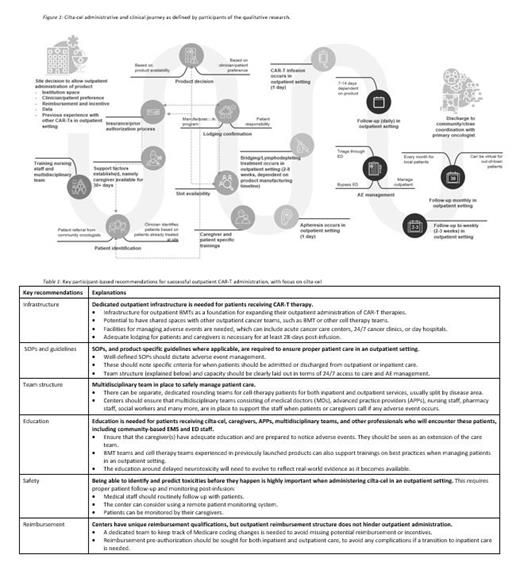Background: The use of CAR-T cell therapy has transformed treatment paradigms in B-cell malignancies. Ciltacabtagene autoleucel (cilta-cel) was approved for use in RRMM after four or more prior lines of therapy in 2022. While the pivotal studies exclusively treated patients in an inpatient setting, robust infrastructure planning at some centers across US has fostered outpatient administration of the commercially available product. Outpatient administration of CAR-T is more desirable due to superior financial sustainability, lower healthcare resource utilization, and greater patient autonomy during the treatment. Hence, we conducted a qualitative study to evaluate clinical and administrative perspectives and trends in outpatient administration of commercialized cilta-cel with an aim to understand best practices from certified CAR-T centers in the USA.
Methods: A targeted literature review was conducted to better understand current practices around outpatient administration of CAR-T, and inform the development of primary research materials for designing subsequent interviews. Next, two 60-minute exploratory interviews were conducted with multi-stakeholder participants (n=5) from two certified cilta-cel centers, each with significant volume of outpatient administration of cilta-cel. Following the qualitative analysis of interviews, two 90-minute panels were conducted with multi-stakeholder participants (n=14) from six certified cilta-cel centers, including centers from exploratory interviews, focusing on clinical and administrative topics across the patient journey.
Results: Each center in the study treated approximately 15-30 patients with cilta-cel in the outpatient setting. Using Likert scales, participants from all centers ranked space/capacity as the most important factor in decision-making process for outpatient cilta-cel administration, and ranked reimbursement incentives as a highly (67% of participants) or a moderately (33%) important factor. All participants agreed that having a dedicated outpatient infrastructure (dedicated space such as bed availability and internal processes including standard operating procedures (SOPs)), 24/7 support, outpatient bone marrow transplant (BMT) or cell therapy experience, and robust multidisciplinary teams were key to setting-up successful outpatient centers for cilta-cel therapy.
The participants agreed that cilta-cel can be administered safely in an outpatient setting due to generally predictable, delayed onset of potential AEs, except in patients with significant comorbidities or organ dysfunction. Participants also considered caregiver support and lodging availability as factors of importance for outpatient administration. Institutionally established AE monitoring protocols are critical for safe use of cilta-cel in an outpatient setting. Over 50% of the centers interviewed have recently started to administer tocilizumab to treat mild grade 1 cytokine release syndrome (CRS) in an outpatient setting. Based on the findings across the phases of research, the patient journey for outpatient administration of cilta-cel was updated (Figure 1). While patients may be admitted for toxicity events, 100% of centers interviewed had 24-hour coverage and bed availability for these patients if needed.
Conclusions: Overall, this study further supports the notion that centers can safely administer cilta-cel in an outpatient setting, if appropriate infrastructure is in place. Additional best practices for new outpatient sites include adequate infrastructure, SOPs, a well-trained and multidisciplinary team, and education of patients and caregivers (Table 1). Outpatient management and earlier intervention for low-grade AEs is currently evolving, with more real-world research required. Continued expert sharing of best practices can aid centers in implementing outpatient administration of CAR-T therapies.
Funding: This analysis was supported by Janssen Research & Development, LLC and Legend Biotech USA, Inc
Disclosures
Hansen:BMS IMW Ide-Cel Academic Advisory Board: Membership on an entity's Board of Directors or advisory committees; Karyopharm: Consultancy, Research Funding; BMS: Consultancy, Research Funding; Janssen: Consultancy; Survivorship: Honoraria; Pfizer: Consultancy; International Myeloma Society Young Investigator Award: Research Funding; Pentecost Family Myeloma Research Center: Research Funding; Onc Live: Honoraria; BMS MM ASH Steering Committee: Membership on an entity's Board of Directors or advisory committees; MM Pfizer Advisory Board: Membership on an entity's Board of Directors or advisory committees. Dhakal:Janssen, Karyopharm, GSK, Arcellx, GSK, Sanofi, Genentech, Pfizer: Consultancy, Honoraria, Speakers Bureau. Hamadani:Omeros: Consultancy; Genmab: Consultancy; Abbvie: Consultancy; Caribou: Consultancy; Incyte: Consultancy; CRISPR: Consultancy; ADC therapeutics: Consultancy, Honoraria, Research Funding, Speakers Bureau; Bristol Myers Squibb: Consultancy; AstraZeneca: Speakers Bureau; Kite, a Gilead Company: Consultancy, Speakers Bureau; BeiGene: Speakers Bureau; Gamida Cell: Consultancy; Genmab: Consultancy; Kadmon: Consultancy; Legend Biotech: Consultancy; MorphoSys: Consultancy; Novartis: Consultancy; SeaGen: Consultancy; Astra Zeneca: Speakers Bureau; BeiGene: Speakers Bureau; Sanofi Genzyme: Speakers Bureau; Astellas: Research Funding; Spectrum Pharmaceuticals: Research Funding; Takeda: Research Funding; Genentech: Honoraria; Myeloid Therapeutics: Honoraria. Dingli:Apellis: Consultancy; Sanofi: Consultancy; Sorrento: Membership on an entity's Board of Directors or advisory committees; Genentech: Consultancy; Novartis: Consultancy; BMS: Consultancy; Janssen: Consultancy; K-36 Therapeutics: Research Funding; Alexion (AstraZeneca); Apellis Pharmaceuticals; BMS; GSK; Janssen; Novartis; Sanofi; Takeda: Consultancy; BioCryst: Consultancy. Jain:CTI Biopharma, Kartos therapeutics, Incyte: Research Funding; Care Dx, Bristol Myers Squibb, Incyte, Abbvie, CTI, Kite, Cogent Biosciences, Blueprint Medicine, Telios pharma, Protagonist therapeutics: Membership on an entity's Board of Directors or advisory committees. Liu:The Janssen Pharmaceutical Companies of Johnson and Johnson: Current Employment. De Braganca:Janssen: Current Employment. Lodowski:Janssen: Other: PRMA Consulting Ltd was contracted by Janssen to work on this project; PRMA Consulting Limited: Current Employment. Sander Kirschenbaum:PRMA Consulting Limited: Current Employment; Janssen: Other: PRMA Consulting Ltd was contracted by Janssen to work on this project. Okorozo:PRMA Consulting Ltd.: Current Employment; Janssen: Other: PRMA Consulting Ltd was contracted by Janssen to work on this project. McFarland:Legend Biotech: Current Employment, Current equity holder in publicly-traded company. Perciavalle:Legend Biotech: Current Employment, Current equity holder in publicly-traded company. Huo:Janssen Scientific Affairs, LLC: Current Employment, Current equity holder in publicly-traded company. Patel:AbbVie; Allogene Therapeutics, Inc.; Arcellx; Bristol Myers Squibb/Celgene Corporation; Cellectis; Janssen Pharmaceuticals, Inc.; Nektar Therapeutic; Poseida Therapeutics; Precision BioSciences, Inc.; and Takeda Pharmaceuticals U.S.A., Inc.: Research Funding; AbbVie; Arcellx, AstraZeneca; Bristol Myers Squibb/Celgene Corporation; Caribou Science; Cellectis; Curio Bioscience; Genentech; Janssen Pharmaceuticals, Inc.; Karyopharm; Legend Biotech; Merck & Co., Inc.; Oncopeptides; Pfizer; Precision BioSciences: Consultancy; Takeda: Consultancy.


This feature is available to Subscribers Only
Sign In or Create an Account Close Modal